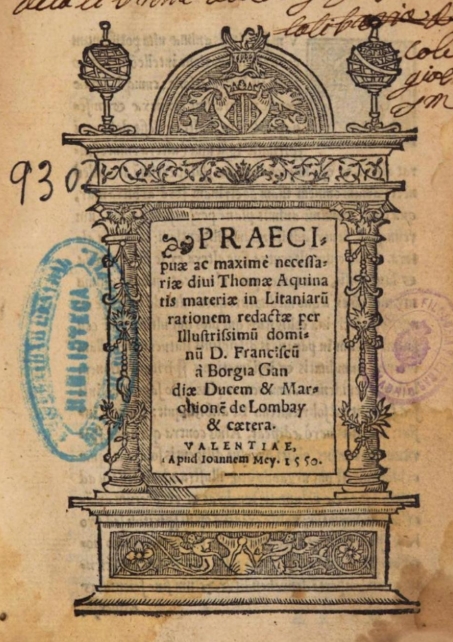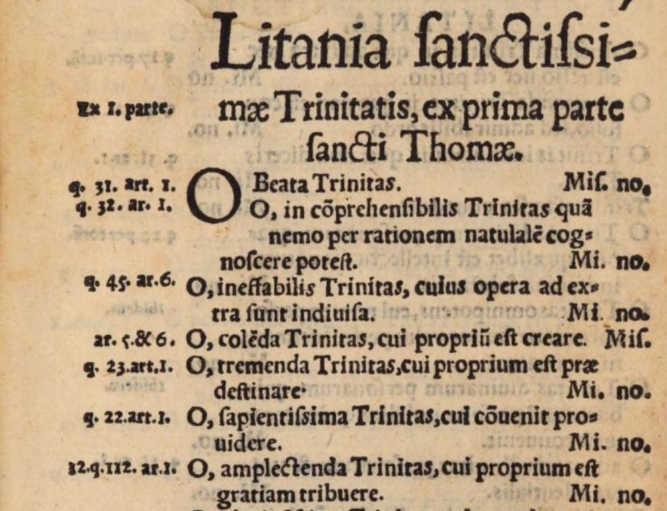
Imagine studying the doctrinal theology of Thomas Aquinas and then turning it, in considerable detail, into praise.
That’s what sixteenth-century Jesuit Francis Borgia did. He wrote a book which is basically key sections of the Summa Theologia cast into the form of prayers. Litanies, to be precise: sequences of requests, for liturgical recitation with a set response.
The book has never been translated into English. I did find the first section, which is a long prayer based on Thomas’ account of the divine attributes, in a nice translation at this site. I especially like how it’s laid out, like the original, in three columns, with the left column showing the relevant passage from the Summa. , the center being the petition itself, and the right column being a brief note of the response: “have mercy on us.” As you can see from the original, both the Summa reference and the set response are heavily abbreviated (“mis. no.” = “have mercy on us”).

The long section on the Trinity drew my attention, and when I shared it with Ryan Hurd he quickly produced a translation of it. Since it’s not available anywhere else, we thought we’d post it here.
I’m not sure how useful this litany is for readers who aren’t already pretty well versed in the relevant sections of the Summa Theologiae. Some of the things prayed here are so technical that I had to look up the relevant section of the Summa to see what Borgia was paraphrasing. And I certainly can’t imagine making any actual use of this in a church setting(!). But it’s a rich meditation, turning the theology of the Trinity into adoration of the Trinity.
O blessed Trinity, have mercy on us.
O incomprehensible Trinity, whom no one can know by natural reason, have mercy on us.
O ineffable Trinity, whose external works are undivided, have mercy on us.
O Trinity, who is to be worshiped, who alone creates, have mercy on us.
O Trinity, who is to be held in awe, who alone predestines, have mercy on us.
O Trinity most wise, who alone foresees, have mercy on us.
O Trinity, who is to be adored, who alone gives grace, have mercy on us.
O Trinity most glorious, who alone confers glory, have mercy on us.
O inscrutable Trinity, in whom existence and power are one, have mercy on us.
O blessed Trinity, for whom there is no before or after, have mercy on us.
O Trinity most beautiful, in whom there is no inequality, have mercy on us.
O Trinity most exalted, to whom all are compared by a vestige, similitude, or image, have mercy on us.
O unsearchable Trinity, for whom it is impossible to not exist, have mercy on us.
O Trinity most high, in whom there is no action or reception within, have mercy on us.
O Trinity, who is to be esteemed, in whom there is no confusion, but wondrous order, have mercy on us.
O immutable Trinity, which one must not utter as “triple,” have mercy on us.
Holy Trinity, one God, have mercy on us.
O Trinity of divine persons, each of whom is an individual substance of an intellectual nature, have mercy on us.
O omnipotent Trinity, to whom we bestow the name of “persons,” the most perfect in all nature, have mercy on us.
O Trinity of divine persons, to whom the name “person” applies more worthily than to any creature, have mercy on us.
O Trinity of persons and unity of essence to be adored, have mercy on us.
O perfectly simple Trinity, in whom there is no dependence, have mercy on us.
O Trinity, ocean of infinite clemency, in whom there is no caused cause, have mercy on us.
O Trinity of immense majesty, in whom there is no cause, have mercy on us.
O Trinity of immense goodness, in whom there is no internal limit, have mercy on us.
O Trinity great and glorious, in whom there is not something other, but someone other, have mercy on us.
O Trinity to be adored, in whom there is no internal operation, have mercy on us.
O Trinity unending, in whom there is no part, have mercy on us.
O holy Trinity, whose persons do not produce composition between themselves, have mercy on us.
O glorious Trinity of divine persons, in whom the properties and persons are adored together at once, have mercy on us.
O most delectable divine and one essence of three persons, have mercy on us.
O sweetest divine essence, principle by whom the one generating principally generates, have mercy on us.
O highest divine essence, neither generating nor generated, have mercy on us.
O purest essence, which thing you are who are generating, have mercy on us.
O most wise essence, which you are the same with in person, have mercy on us.
O perfectly simple essence, which you are as three persons, have mercy on us.
O laudable divine essence, the principle, in whom the begotten is likened to the begetter as an active subject, have mercy on us.
O fearsome divine essence, common to generating, generated, and spirated, have mercy on us.
O essence to be worshiped, which you are as Father, have mercy on us.
O essence to be feared, which you are as Son, have mercy on us.
O essence most beautiful, which you are as Holy Spirit, have mercy on us.
O essence immense, which is Father, Son, and Holy Spirit, have mercy on us.
O essence to be adored, which does not really differ compared to the relation, but is only itself in the relation, have mercy on us.
O unbegotten essence of divine persons, in which the relations distinguish, such that we assign the least distinction, have mercy on us.
O mellifluous essence of divine persons, undivided in them, because the persons are distinctly through real relations, have mercy on us.
_____________________________
(Note: There are a few oddities here that neither Ryan nor I could sort out, even by cross-referencing to the noted section of the Summa. Borgia seems to be working with an idea of what Thomas means by the internal works of God that leads him to say things differently than I am used to; he thinks Q27 as a whole denies both actio and passio in God, which is hard for me to square with what Thomas says of the processions there. But the overall effect of pray-reading this tract of doctrine is still evident.)